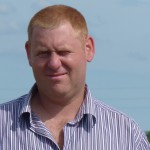MARC KUNTZMANN, FARMER IN KRAUTERGERSHEIM Crops of cereals and vegetables (potatoes, cabbages, etc.), 40% of his farm is in the European Hamster strict protection zone, member of CUMA de la Plaine
How could we describe your type of farming, are you a ‘conventional farmer’?
Yes, I practise conventional farming, but with the aim of progressively reducing the quantities of plant protection products and labour. My goal is to increase the levels of organic matter in the soil. Over 40 or 50 years, the amount of organic matter has halved.
Several of your plots of land are included in the LIFE Alister experiments; what interests you in this programme
The programme enables me to carry out crop trials while receiving support, both technically and financially, which limits the risks on my farm. Issues regarding vegetables are more complicated than those for cereals; for example, the ground must still be worked for potatoes. I discuss things with the Chamber of Agriculture and the ONCFS (French National Hunting and Wildlife Agency), and we try to come up with ideas to resolve difficulties. They have to understand our constraints; the experiments take up time and the weather in the last few years has not helped. It’s not because a trial has worked once that a solution has been found, and vice versa. We are working for the next generation; we can’t leave it with ground that no longer contains any matter.
So, do you see this as a long-term investment?
Not only that, you have to be able to live from your work too! I would say that in the short term, I’m aiming for a reduction in costs, fewer plant protection products, less time spent working on each hectare and less fuel. At the same time, I’m working for the long term because the more worms there are, the better things will be. Worms work for free, as well as working 7 days a week!
Would you have preferred a LIFE experiment to save worms then?
Haha, no; things work together, they form a whole. When you begin with one thing, it paves the way and then little by little, step by step, things improve. We’ll find solutions for the European hamster and for farmers.


